-
New York Film Festival 2010

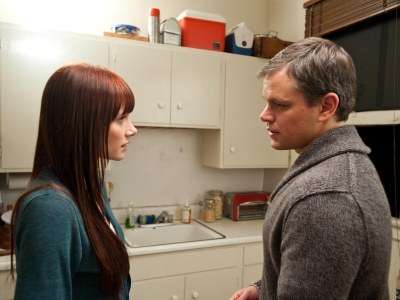
Bryce Dallas Howard, Matt Damon, Hereafter, Closing Night
New York Film Festival 2010
Welcome to the Festival Coverage thread for the 48th New York Film Festival, fall 2010, put on by the Film Society of Lincoln Center. Filmleaf's General Film Forum discussion thread for the NYFF begins here.
INDEX OF LINKS TO REVIEWS
Another Year (Mike Leigh 2010)
Aurora (Cristi Puiu 2010)
Autobiography of Nicolae Ceauşescu, The (Andrei Uticǎ 2010)
Black Venus (Abdellatif Kechiche 2010)
Carlos (Olivier Assayas 2010)
Certified Copy (Abbas Kiarostami 2010)
Film Socialisme (Jean-Luc Godard 2010)
Hereafter (Clint Eastwood 2010)
Inside Job (Charles Ferguson 2010)
LennonNYC (Michael Epstein 2010)
Letter to Elia, A (Scorsese, Jones 2010)
Meek's Cutoff (Kelly Reichardt 2010)
My Joy (Sergei Loznitsa 2010)
Mysteries of Lisbon (Raúl Ruiz 2010)
Of Gods and Men (Xavier Beauvois 2010)
Oki's Movie (Hong Sang-soo 2010)
Old Cats (Sebastián Silva, Pedro Peirano 2010)
Poetry (Lee Chang-dong 2010)
Post Mortem (Pablo Larraín 2010)
Quattro Volte, Le (Michelangelo Frammartino 2010)
Revolución (ten short films from Mexico, 2010)
Robber, The (Benjamin Heisenberg 2010)
Robinson in Ruins (Patrick Keiller) 2010
Silent Souls (Alexei Fedorchenko 2010)
Social Network, The (David Fincher 2010)
Strange Case of Angelica, The (Manoel de Oliveira 2010)
Tempest, The (Julie Taymor 2010)
Tuesday, After Christmas (Radu Muntean 2010)
Uncle Boonmee Who Can Recall His Past Lives (Apichatpong Weeresethakul 2010)
We Are What We Are (Jorge Michel Grau 2010)
These reviews have also been published on Flickfeast.uk.
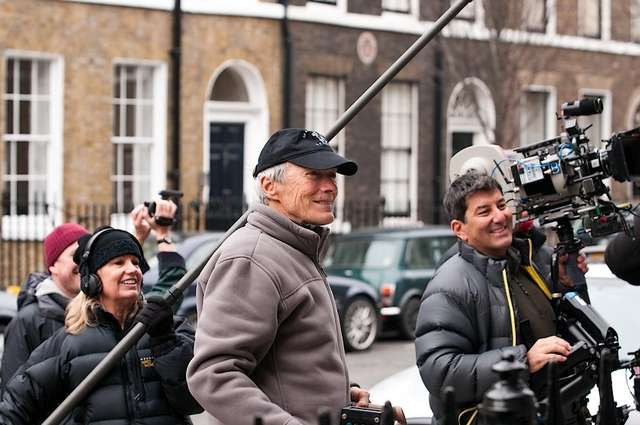
Clint Eastwood directing Hereafter in London
Last edited by Chris Knipp; 11-09-2012 at 01:50 AM.
-
PRESS SCREENING SCHEDULE Sept. 15-Oct. 7, 2010
Screenings/Q&A's scheduled - August 30, 2010.
(Also printed on the General Forums thread for the NYFF 2010 here)
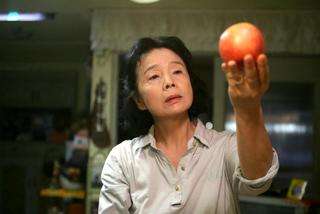
POETRY - LEE CHANG-DONG
Mon Sep 13
Noon - 5pm
Credential pick-up only
Tue Sep 14
9am - PRISONERO 13 (76m)
10:30am - EL COMPADRE MENDOZA(85m)
12:30pm - LET'S GO WITH PANCHO VILLA (92m)
(Masterworks: Fernando de Fuentes' Mexican Revolution Trilogy)
Wed Sep 15
9am - PALE FLOWER Masterworks Elegant Elegies: The Films of Masahiro Shinoda (96m)
11am - SILENCE (129m) [?]
2pm - CAMERAMAN: THE LIFE AND WORK OF JACK CARDIFF Craig McCall, 2010, UK; 86m[/B] (83m) (Nyff Special Event)
Thu Sep 16
9 am THE AUTOBIOGRAPHY OF NICOLAE CEAUSESCU Andrei Ujic, 2010, Romania; 180m
Noon - press conf VIA SKYPE
1pm - NURENBERG [The Schulberg/Waletzky Restoration] (80m) (Nyff Special Event, "Masterworks" series )
2:30pm - press conf
Fri Sep 17
9am - CARLOS, Olivier Assayas, 2010, France, 319 min
Mon Sep 20
9am - POETRY (Shi), Lee Chang-dong, 2010, South Korea, 139 min
11:19am - Poetry - press conf VIA SKYPE
12:30pm - LE QUATTRO VOLTE, Michelangelo Frammartino, 2010, Italy, 88 min
2pm - press conf VIA SKYPE
2:30pm - OKRI'S MOVIE (Ok hui ui yeonghwa), Hong Sang-soo, 2010, South Korea, 80 min
Tue Sep 21
9am - ROBINSON IN RUINS, Patrick Keiller, 2010, UK, 101 min
10:40am - press conf VIA SKYPE
11:45am - UNCLE BOONMEE WHO CAN RECALL PAST LIVES (Lung Boonmee raluek chat),
Apichatpong Weerasethakul, 2010, UK/Thailand, 113 min
1:30pm s - press conf
2:30pm - CERTIFIED COPY (Copie conformé), Abbas Kiarostami, 2010, France/Italy, 106 min
France, 120 min
4:30pm - press conf
Wed Sep 22
9am - LENNON NYC, Michael Epstein, 2010, USA, 115 min
11am - press conf
Noon - A LETTER TO ELIA Martin Scorsese & Kent Jones, 2010, USA; 60m (Special Event, Masterworks)
2:30pm - TUESDAY AFTER CHRISTMAS (Marti, dupa craciun), Radu Muntean,
Romania, 99 min
4:15pm - press conf VIA SKYPE
5:15pm - THE ROBBER (Der Räuber), Benjamin Heisenberg, Austria/Germany, 90 min
6:45pm - press conf
7:30pm - SILENT SOULS (Ovsyanki), Alexei Fedorchenko, Russia, 75 min
8:45pm - press conf
Thu Sep 23
9am - MY JOY (Schastye moe), Sergei Loznitsa, 2010, Ukraine/Germany, 127 min
11:08am - press conf VIA SKYPE
12:30pm - OF GODS AND MEN (Des homes et des dieux), Xavier Beauvois, 2010,
2:30pm - press conf OF GODS AND MEN
Fri Sep 24
9am - THE SOCIAL NETWORK, David Fincher, 2010, USA, 120 min
11am - press conf
Noon - FILM SOCIALISME, Jean-Luc Godard, 2010, Switzerland, 101 min
2pm - Views from the Avant-Garde (sampler)
Mon Sep 27
9am - AURORA, Cristi Puiu, 2010, Romania, 181 min
Noon - press conf
1pm - THE STRANGE CASE OF ANGELICA (O estranho caso de Angélica), Manoel de Oliveira,
Portugal, 97 min
(tentative) press conf
Tue Sep 28
9am - BLACK VENUS (Venus noire) , Abdellatif Kechiche, France, 166 min
(tentative) press conf
12:30pm - POST MORTEM, Pablo Larrain, 2010, Chile/Mexico/Germany, 98 min
2:10pm - press conf VIA SKYPE
Wed Sep 29
9am - INSIDE JOB, Charles Ferguson, 2010, USA, 120 min
11am - press conf
1pm - BOXING GYM Frederick Wiseman, 2010, USA; 91m (Nyff Special Event)
(tentative) - press conf
Thu Sep 30
10am - WE ARE WHAT WE ARE (Somos lo que hay), Jorge Michel Grau, Mexico, 90 min
Noon - THE TEMPEST, Julie Taymor, 2010, USA, 110 min(110m)
2pm - press conf
Fri Oct 1
NO PRESS &INDUSTRY SCREENINGS OR PRESS CONFERNECESF
Mon Oct 4
9am - ANOTHER YEAR, Mike Leigh, 2010, UK, 129 min
11:10am - press conf
12:30pm - MEEK'S CUTOFF, Kelly Reichardt, 2010, USA, 104 min
2:15pm - press conf
Tue Oct 5
9am - FOREIGN PARTS Verena Paravel & J.P. Sniadecki, 2010, USA; 80m (Nyff Special Event)
(tentative) press conf
11:30am - REVOLUCIÓN, Mariana Chenillo, Fernando Embecke, Amat Escalante, Gael Garcia
Bernal, Rodrigo Garcia, Diego Luna, Gerardo Naranjo, Rodrigo Plá, Carlos Reygadas,
Patricia Riggen, 2010, Mexico, 110 min
1:15pm - press conf VIA SKYPE
Wed Oct 6
9am - OLD CATS (Gatos viejos), Sebastian Silva, 2010, Chile, 88 min
10:30am - Old Cats - press conf
Noon - Shorts program (compilation - 123m)
Thu Oct 7
9am - MYSTERIES OF LISBON (Misterios de Lisboa), Raul Ruiz, Portugal/France, 272 min
1245p - press conf
Fri Oct 8
10am HEREAFTER (Clint Eastwood,2010, USA, 126, 126 min
Last edited by Chris Knipp; 09-15-2010 at 10:21 PM.
-
Martin scorsese, kent jones: A letter to elia (2010)
MARTIN SCORSESE, KENT JONES: A LETTER TO ELIA (2010)
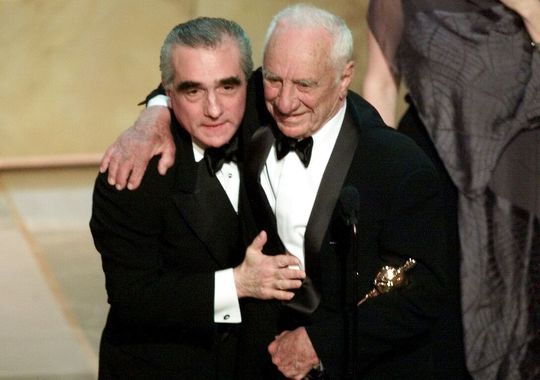
SCORSESE AND KAZAN AT THE OSCARS IN 1999
Scorsese's very personal tribute to a film master
This 60-minute documentary is a love-letter, really, from Martin Scorsese, perhaps the most celebrated major American filmmaker of today, to his controversial hero, artistic model, and emotional influence, once the greatest American filmmaker (they called them directors back then) of his day, Elia Kazan. Kazan of course is the author of three great movies of their time, On the Waterfront, A Streetcar Named Desire (the latter not much discussed here), and East of Eden, showcasing the Actors Studio talents of Marlon Brando and James Dean. Kazan was a co-founder of the Actors Studio. But Kazan's favorite film was his black and white immigrant epic, America America, which opens this film (in a gorgeous pristine restoration), and emerges as deeply significant to Scorsese too.
A celebration of the films of Elia Kazan (very selectively considered), Letter to Elia goes over Kasan's personal history, his rise as an actor on Broadway, then as a theatrical director, finally as a maker of what at first were mostly filmed plays in Hollywood. The reach of Kazan's whole career is considered. And that includes his very questionable "outing" of 8 fellow leftists to HUAC Congressional witchhunters in the Fifties. Scorsese describes this, which meant even the Academy's very late lifetime achievement award was much questioned; but he doesn't justify or even explain it. Why did Kazan do that? How could he do it? The only implication is that for Scorsese, Kazan was too important an early influence to become a fallen idol, so he straddles the fence. This is a panegyric, not a cool-headed analysis. Interestingly enough, Kazan did do his best film work after this betrayal. But where his films may seem dated today, Scorsese prefers to see them as he did when young, vibrant, exiting, and personally significant. Scorsese's later personal friendship with Kazan is documented with many stills and his loyalty and support movingly shown by their embrace at the Academy Awards honorary Oscar time, when many refused to stand to celebrate the old man in 1999 when he was 90. He died in 2003.
This is also very much a spoken and illustrated tribute to Scorsese's lonely cinephile youth and to the old classic New York movie houses, now all gone, where he sat alone after buying a ticket for 12 or 15 cents and sighed and sobbed with the family conflicts of Brando and Steiger in Waterfront and Dean in Eden. Scorsese goes over specific scenes in some detail, playing the whole speech by Brando that leads up to "I coulda been a contenda." The director is talking about love of movies, but first and foremost he recounts how these films were personal psychodramas for him, and also in the case of On the Waterfront significantly drew realistically on the "mean streets" world he himself grew up in, in Little Italy. It's only later, the director suggests, that he went back and studied the technical aspects, the camerawork and editing of these for him seminal films. It's not noted by Scorsese, but where Kazan made stars of Brando and Dean, he created idols himself like Di Nero and DiCaprio.
My own favorite is America America, whatever the social or artistic significance of Kazan's better known films; so it's nice to know it was the one that mattered most to him, and to understand why. It was based on the life of an uncle, and he, and Scorsese too, he says, as (in Kazan's case) from a Greek family out of Turkey, always saw the world as an outsider.
Made as one of the American Masters series for American public television. Narrated, written and directed by Martin Scorsese. Co-authored and co-directed by Kent Jones, a former member of the selection committee of the New York Film Festival and the Film Society of Lincoln Center and Associate Director of Programming there. Jones has collaborated with Scorsese on other documentaries, including My Voyage in Italy. The voice of Kazan in dramatized quotations is performed by Elias Koteas. Seen and reviewed as a sidebar item, a Masterworks series Special Event, as part of the New York Film Festival at Lincoln Center. Debuted simultaneously Sept. 4 at Venice and Telluride, scheduled for Sept. 27 at the NYFF.
Last edited by Chris Knipp; 08-05-2014 at 11:58 PM.
-
Radu Muntean: TUESDAY, AFTER CHRISTMAS (2010)
RADU MUNTEAN: TUESDAY, AFTER CHRISTMAS (2010)
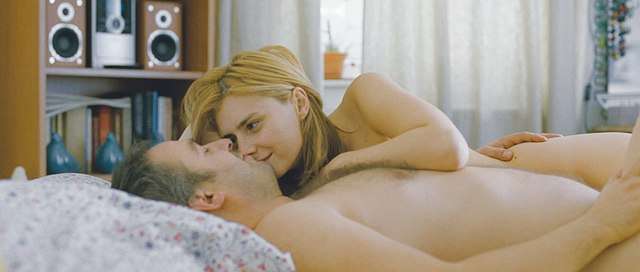
MIMI BRANESCU AND MARIA POPISTASU IN TUESDAY, AFTER CHRISTMAS
A man with two women, and a daughter who needs braces
Romanian director Radu Muntean's 99-minute Tuesday, After Christmas (Marti, dupa craciun) is a scrupulously mondane study of an adulterer with a wife and 10-year-old daughter whose orthodontist girlfriend happens to be responsible for correcting the little girl's slight under-bite. When dad takes daughter for a consultation about braces, mom unexpectedly shows up. This unnecessary encounter at her workplace upsets the girlfriend, which leads the husband to confess his infidelity later to his wife. She wants an immediate divorce and her husband moves to his love nest. And yet, it's Christmas, and when the time comes, the couple still has to show up for the in-laws and play Santa to their daughter. The moral is that marital ruptures don't mean you're excused from decorating the tree and wrapping the presents.
Like other Romanians whose stock is high in the international festival market these days, Muntean specializes in precise, scrupulously unhurried observation of ordinary life. Sometimes there's an important issue brought up. Sometimes there's a darkly ironic message. This time there's mainly just a voyeuristic feeling. We're actually spying on Paul Hanganu (Mimi Branescu), a schlub with some sort of loan office job, as he alternates between his blond girlfriend Raluca (Maria Popistasu), who makes him feel like a stud, and his dark-haired, bespectacled wife Adriana (Mirela Oprisor), with whom he's just a spouse. Muntean's nearly 10-minute opening scene depicts Paul and Raluca nude together on a bed kissing and chatting. They are exceptionally natural and relaxed, but the scene runs too long. It's a miscalculation. It's not what the film is about and just seems included because somebody liked it.
The next scene shows Paul with Adriana sifting through hideous blouses and snow boards at a shop. All these two sequences reveal is what you'd expect. Paul's affair is fresh and sexy for him. His life as a husband is routine. The little girl, Mara (Sasa Paul-Szel), is chirpy, chatty, borderline annoying. All the scenes show off Haganu's stiflingly bourgeois existence. His parents shower Mara with junk. There is much talk of gifts and what they cost; of winter resorts. What is child orthodontistry but a middle-class luxury denied to the working class? The scene in the orthodontistry office might have been rich in irony, but instead is a tedious exercise in pediatric dental terminology.
Finally Tuesday, After Christmas has two good scenes, or two moments when Muntean gets to his point. When Paul subsequently spills the beans -- tells Adriana he's "very much in love" with someone he's met, and she responds with anger and tears -- the Romanian penchant for lovingly examined banality finally pays off, because the emotions are intense enough to make the dialogue thought-provoking. Paul's confession seems extremely unwise as well as ill-timed, but Adriana's response is, as he says, nastier and uglier than what he's been doing. Is Paul's relationship with Raluca worth trashing his marriage? If marital infidelity is wrong, aren't some responses to it from spouses also questionable?
There's also a beautiful irony (though it might have been much subtler and wittier) in the final scene with little Mara's paternal grandparents, when Mara is pushed forward to watch passing carolers so Paul can rush "Santa's" presents into the other room, while Adriana smoothly slips him a present out of her purse to put back there too. This complicity, despite Adriana's earlier clenched-teeth warning that she's not staying for long, is a clear sign that the marriage-and-parent game trumps the adultery drama. And that is a message worth the wait. As with other Romanian films, I am annoyed, I feel the scenes have been dragged out too long (and may even be poorly arranged, as here), and yet there is always something. The acting of the principals is very good here. The camerawork by Tudor Lucaciu has been justifiably commended (especially in the nude scenes). And yet I'm not the only person who is asking if this was worth making a movie about; if Paul, in particular, warranted so much of our attention.
Tuesday, After Christmas was in the Un Certain Regard segment at Cannes, and included in other festivals. Seen and reviewed as part of the New York Film Festival at Lincoln Center.
Last edited by Chris Knipp; 09-19-2010 at 08:32 AM.
-
Benjamin Heisenberg: THE ROBBER (2010)
BENJAMIN HEISENBERG: THE ROBBER (2010)

ANDREAS LUST IN THE ROBBER
What's the rush?
Austrian director Benjamin Heisenberg's sophomore effort The Robber (Der Räuber, 90 min.) is the taut, minimal, intentionally fun-free story of an ex-con from a good family whose endorphin/adrenalin addiction has led him to be both a champion marathoner and a guy who robs bank for a hobby. Far-fetched? Maybe, but it's based on actual events.
Andreas Lust gives a committed and convincing performance as the runner/robber. Essential to the commitment is that he looks the part -- and during the shooting was in serious running shape. (The source novel author and screenplay co-writer Martin Prinz, who once ran a race with the real runner-bank robber, was Lust's trainer.) Long distance running isn't something you can fake. Though the film may be five minutes or so longer than it needs to be, there's no excess fat on Lust's body or slackness in his muscles. And the film itself is seriously well constructed, as lean in its cool existential minimalism as its main character.
This is a protagonist who's a rather unique combination. The logic that unifies his personality is his essential solitude. As Dr. George Sheehan memorably argued in Running and Being and other books, the distance runner, and for that matter the endurance athlete, is not primarily a social being. He resolves his issues with people by putting a lot of space between himself and them out on the roads and hills. The long hours of training appeal to one who prefers to be alone. But the aloneness of Johann Rettenberger (Lust) is greater than that. The preoccupations and goals of the ordinary world mean nothing to him. Not to mention the laws.
Appropriately, because he lives locked inside a small world in his own mind, the film begins when Rettenberger is in prison finishing a six-year sentence for bank robbery. In the yard, he doesn't socialize. He runs around it, racking up mileage in circles. He has managed to get a running treadmill installed in his little cell, and he continues the workouts there. He's an obsessively well-trained, driven, and talented long distance runner. If fact he's so good, he comes from behind to beat all the favorites and win the Vienna Marathon a short time after he's been released from prison. Ironically, he has gone from his prison cell to a tiny hotel room that for his purposes is less useful and perhaps no more appealing. Where is the freedom?
There are only two people in Rettenberger's life; he has not connected with his family upon release. There is the parole officer, Bewährungsbeamter (Markus Schleinzer), whom he's met with before release and to whom he has pointedly made no promises. He says only that he'll be glad not to run in circles any more. The parole officer wants him to avoid coming back in. He's supposed to get a job. At an employment office he runs into a former acquaintance from a good family, Erika (the poised, centered Franziska Weisz), who now works there. Johann meets up with Erika later and till he "settles down" she lets him live in a room of her big family apartment, now empty since her immediate relatives have all died; she's isolated too. (A snapshot of the large family now departed becomes a symbol of isolation.) After going to a cinema and watching a violent movie, which greatly amuses her and he watches with sphinx-like approval, they drift into a sexual affair.
Rettenberger has gone back to bank robbing right away. His routine rarely varies. He steels a car, always playing loud music as he drives. He wears a hoodie and a mask (which doesn't look much different from his pale, expressionless face), brandishes a machine gun, fills a duffle bag with cash, drives off, leaves the car in a wood and runs away. He puts the cash in plastic bags and stuffs them under his bad at Erika's place. He's rapidly racking up robberies, faster than he's winning races. The cash, not spectacular but much more than his race winnings, means little to him.
Meanwhile the fussy, well-meaning and dogged parole officer is not pleased. He follows Rettenberger to races and demands that attempts be made to find a job. He gets in return more and more hostility and silence. Rettenberger has little to say. In fact this could largely be a silent movie. It will appeal to those who like being challenged to make an effort; it makes no overtures to the audience whatsoever. Rettenberger is compelling but unappealing as a character.
The link between competitive athletics and bank robbing is an interesting one some may feel the film insufficiently develops. The Variety reviewer comments that Rettenberger seems to get no visible rush from either running or crime. He does smile very broadly once, when he wins the Vienna Marathon. He also carefully monitors his heart-rate in both processes. His effort may grow from some anti-social Nietchiean self-image. As a former marathoner myself, I found the idea of carrying ultimate conditioning into challenges to human as well as natural law intriguing and not impossible, especially if you buy into Dr. Sheehan's mystique of the anti-social distance runner. I was also reminded of Kathryn Bigelow's classic Point Break, with its athletic surfer-bank robbers and their mystical leader nicknamed Bodhi (the late Patrick Swayze). Those looking for conventional crime thriller material here will be sadly disappointed. It's essential to Heisenberg's protagonist that he's not at all a working- or criminal-class person or part of the criminal world but an amateur crook, without the resources of prison networking. Bank robbing as he performs it is an artisanal craft mostly requiring just cojones and speed.
In the end running becomes, of course, running away; and the beauty of The Robber is that it is a metaphor for itself throughout.
Shown at various international festivals beginning with Berlin, where it was nominated for a Golden Bear award, The Robber/Der räuber was seen and reviewed as part of the New York Film Festival at Lincoln Center.
Last edited by Chris Knipp; 09-19-2010 at 08:32 AM.
-
Andrei Ujicǎ: THE AUTOBIOGRAPHY OF NICOLAE CEAUŞESCU (2010)
ANDREI UJICǍ: THE AUTOBIOGRAPHY OF NICOLAE CEAUŞESCU (2010)
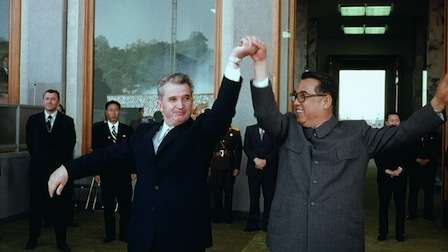
NICOLAE CEAUŞESCU VISITS KIM JONG IL IN THE AUTOBIOGRAPHY
Life at the top
In The Autobiography of Nicolae Ceauşescu, Andrei Ujică has put together a film that lasts three hours, composed almost entirely of government footage of the Romanian dictator who ruled (officially as Secretary General of the Romanian Communist Party and President of he country) from 1965 to 1989, when he was deposed in a coup. There are also some slightly more personal home movies. Three hours is too long, but that is precisely the point: that makes the film a festival film, for festival devotees take watching the unwatchable or unendurable to be a badge of honor, and excessive length conveys a specialness an ordinary film doesn't possess. Moreover, with this length Andrei Ujică is also making several points of his own. He's showing what the Romanian people had to endure, and for how long -- and what Ceauşescu had to endure too, the boring rituals of playing the role of head of state. The film is book-ended by a few minutes of rough videotape of Ceauşescu and his wife Elena when the government has been taken over, and he is being held hostage and stonewalling all efforts to make him explain his brutal efforts to repress the revolts in Timişoara and Budapest.
Ceauşescu allowed himself to be routinely photographed for an hour every day of his regime, and Ujică has culled his film from that vast official accumulation, editing it in his own way. This is an "autobiography" by someone else, like those of Malcolm X by Alex Haley and Alice B. Toklas by Gertrude Stein. The title, and the means of presentation, without commentary, of this for the most part bland, impersonal footage, express in some Orwellian sense the idea that Ceauşescu is barely a real person; that there was never any real difference between his public and his private self; that he was a cipher standing for a repressive regime. He is the state with no face.
This regime is shown by endless footage of public events, parades of shiny black limousines, tanks, troops marching, party officials high up on rostrums reviewing; on visits to China or the Korea of Kim Jong Il, thousands of costumed citizens moving smartly in unison; giant blown up photographs of Ceauşescu and his wife; drives along vast boulevards with no trees, only government buildings, stage sets where human beings have no extra-ceremonial function.
This Autobiography is enigmatic, yet revealing. It's grand, yet boring and mundane. Its subject is repellent -- or at best unappealing -- but after spending so much time with him we, like Andrei Ujică by his own admission, come to feel a certain sympathy. How can he endure the boredom of all the peasant handicraft fairs, the dances, the handshakes, the parades, the conversations with Eastern Bloc leaders about the weather, the ceremonial meetings with Nixon, Carter, Queen Elizabeth? He must be a very brave and patient man -- in some odd way, a good sport. (Rumor has it that he was ill-humored in later years, but not in public.)
Andrei Ujică points out in an interview that Ceauşescu was a peasant who spent a full seven of his earliest years in prison, which strengthened his intense, simple belief in communist ideology (he changed the country's official title from "socialist" to "communist." His pep talks about communism's virtues are without depth but enthusiastic, and he always has then at the ready. In speech-making he holds a sheet of paper up in the air in front of him but speaks without looking at it. This also reflects the fact that he can say whatever he wants. He is repeatedly renominated and reelected by the party by acclamation. Once, toward the end, an official manages to protest before a large party audience at the boss's being nominated for the central committee and thereby guaranteeing his own releection, but there is a roar of disapproval, a standing ovation, chants of Ceauşeacu's name: "Reelect! Reelect!" Where are the dissenters? Where are the planners of the coup? We don't get to see them. They're behind a wall of propaganda and monuments of Stalinist wedding-cake architecture. This film mesmerizes us with that wall. But we don't believe it. We know this is a long, careful charade.
A charade bought into by East and West. Besides state visits to China, some gleeful, Nixon came calling, and so did De Gaulle (in a Caravalle), and Ceauşescu stayed at Buckingham Palace and when Jimmy Carter received him in one of his four visits to Washington he called him "a great leader of a great country." His regime was more open toward the West than other communist countries, and we get glimpses of that.
When on domestic official tours, Ceauşescu often surveys wreckage, floods, acres of mud; but indoors, he gazes on vast miniaturized models of perfect, pastry-white cities. On indoor tours, he visits big food shops packed with goods and picks up loaves of bread. "The crust is too thick," he says, or "the quality is better outside the capital." The packed shops are a front. The empty ones aren't photographed. By what we see, we know what is hidden. The indifference to what was really going on in the country was going to catch up with Ceauşescu and lead to his execution (not included here).
Ceauşescu, Ujică says in the interview, was "like a peasant who suddenly became a great landlord." In private life he was exemplary, except for avarice: in his last years he kept up to 30% of the country's GNP for himself when the country was barely growing. All he was doing was hunting deer and bears and building palaces. Informal footage shows he and his wife were both terrible at volleyball and she was a sloppy swimmer. Could he do anything well? Yes, he could endure. He looked good in suits and overcoats and scarves and hunting tweeds. His hair was combed. His speeches were sprightly. He stayed there.
The minor Eastern Bloc regimes were vast events that were essentially non-events. Ujică celebrates that fact in this aesthetically pure exploration of the vast, epic emptiness and empty-headedness that is the life of a tyrannical head of state.
Shown at Cannes, where it had its world premiere, and other festivals, this was seen and reviewed as a Special Event of the New York Film Festival 2010 at Lincoln Center. I dare you to sit through it.
 Posting Permissions
Posting Permissions
- You may not post new threads
- You may not post replies
- You may not post attachments
- You may not edit your posts
-
Forum Rules







 Reply With Quote
Reply With Quote





Bookmarks